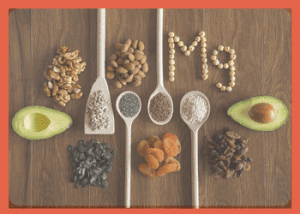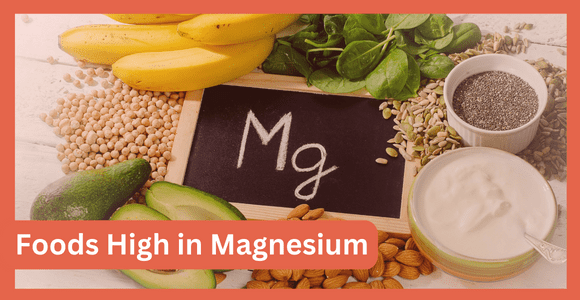Magnesium is an integral part of many essential bodily functions, from regulating blood pressure and sustaining strong bones to bolstering muscle and nerve performance.
Unfortunately, the majority of people do not consume enough magnesium through diet alone – making it one of the most widespread nutritional deficiencies globally! To make sure you’re getting your daily dose, consider supplementing with a quality source of magnesium to ensure optimal health.
Consuming magnesium supplements can be of assistance, yet adding foods rich in minerals to your diet is a more natural and long-term solution. In this article, we will introduce some of the highest sources of magnesium that you should include in your nutrition regimen.
Table of Contents
How Can I Raise My Magnesium Quickly Through Diet?
Although you can easily purchase magnesium supplements at any grocery store or pharmacy, registered dietitians suggest the healthier and more advantageous option of ingesting whole foods that are abundant in this essential nutrient to prevent a deficiency.
 According to the National Institutes of Health, although your body typically absorbs up to 40% of dietary magnesium, deficiency may still occur due to an existing health issue or medical condition, such as alcoholism or certain medications.
According to the National Institutes of Health, although your body typically absorbs up to 40% of dietary magnesium, deficiency may still occur due to an existing health issue or medical condition, such as alcoholism or certain medications.
Astonishingly, almost two-thirds of the Western world do not consume enough magnesium daily as indicated in a review published by Scientifica in September 2017.
To maintain healthy and optimal functioning, the U.S. Department of Health and Human Services suggests that American adults receive a daily magnesium intake ranging between 310 to 420 milligrams (mg).
What Foods High in Magnesium?
- High magnesium foods include leafy green vegetables (such as spinach, Swiss chard, and kale), nuts and seeds (such as almonds, pumpkin seeds, and cashews), and whole grains (such as brown rice, quinoa, and oats).
- Some drinks that are high in magnesium include mineral water, cocoa, and some herbal teas (such as nettle tea).
- Eggs also contain magnesium, with one large egg providing about 6% of the daily recommended intake.
- Bananas are a good source of magnesium, with one medium-sized banana containing about 8% of the daily recommended intake. Other fruits that are high in magnesium include figs, avocados, and raspberries.
- Magnesium deficiency can lead to a range of health problems, including muscle weakness, tremors, and irregular heartbeat. It is important to get enough magnesium through diet or supplements, especially for people with certain health conditions or who are taking certain medications.
- Among fruits, avocado is one of the highest sources of magnesium, providing around 15% of the daily recommended intake per 100g serving.
- Magnesium is also available in supplement form, with different forms of magnesium supplements having varying levels of absorption and bioavailability. Some common forms include glycinate, malate, and taurate.
- Potassium is another mineral that works closely with magnesium in the body, and many high-magnesium foods are also good sources of Mg and potassium. Examples include spinach, pumpkin seeds, and avocados.
- Zinc is another mineral that is important for overall health, and some foods high in magnesium are also good sources of Mg and zinc. Examples include nuts and seeds, whole grains, and dark chocolate.
- For pregnancy, it is especially important to get enough magnesium, as this mineral plays a crucial role in fetal development. Good dietary sources of magnesium for pregnant women include leafy green vegetables, nuts and seeds, and whole grains. Magnesium supplements may also be recommended by a healthcare provider if necessary.
Vegetables High in Magnesium
| Vegetable | Magnesium Content (mg) per Serving |
|---|---|
| Spinach | 157 mg per cooked cup |
| Swiss chard | 150 mg per cooked cup |
| Kale | 30 mg per raw cup |
| Collard greens | 36 mg per cooked cup |
| Beet greens | 65 mg per cooked cup |
| Sweet potato | 32 mg per medium-cooked sweet potato |
| Broccoli | 51 mg per cooked cup |
| Brussels sprouts | 31 mg per cooked cup |
| Artichoke | 72 mg per medium-cooked artichoke |
Fruits High in Magnesium
| Fruit | Magnesium Content (mg) per Serving |
|---|---|
| Avocado | 58 mg per medium avocado |
| Banana | 32 mg per medium banana |
| Figs (dried) | 64 mg per 1/2 cup |
| Raspberries | 27 mg per cup |
| Blackberries | 28 mg per cup |
| Kiwi | 17 mg per medium kiwi |
| Apricot (dried) | 24 mg per 1/4 cup |
| Prunes (dried) | 27 mg per 5 prunes |
| Papaya | 43 mg per medium papaya |
It’s important to note that these values may vary depending on the source and method of preparation. However, incorporating these fruits and vegetables into your diet can help ensure you are getting enough magnesium.
Magnesium Deficiency. Potential Side Effects
Magnesium deficiency is a widespread nutritional inadequacy that can result in several potential side effects. Here are some of the possible symptoms of magnesium deficiency:
- Muscle weakness or cramps
- Fatigue or weakness
- Tremors or twitching
- Irregular heartbeat or palpitations
- High blood pressure
- Nausea or vomiting
- Loss of appetite
- Headaches or migraines
- Insomnia or difficulty sleeping
- Anxiety or depression
It’s critical to pay attention to Mg deficiency since it can lead to some severe chronic illnesses like type 2 diabetes, osteoporosis, and cardiovascular disease. Thus, make sure you have an adequate amount of this vital mineral in your diet or by taking supplements.
If you have a hunch that your body might be lacking in magnesium, reach out to your doctor as soon as possible. They will check for this deficiency and provide the best remedy: whether it’s dietary modifications or taking supplements.
Frequently Asked Questions
How Can I Raise My Magnesium Levels Quickly?
- Incorporate more magnesium-rich sources into your meals to experience the benefits.
- Supplement your diet with an additional dose of magnesium to reap the many benefits it has to offer.
- In order to allow your body to make the most out of magnesium, taking a daily multivitamin is essential. This will provide all of the necessary co-factors for optimal utilization and absorption.
- Limit your intake of alcohol, carbonated beverages, and caffeine.
- Consuming sea vegetables as part of a healthy diet is essential to well-being.
Which Fruit is High in Magnesium?
Dried figs, avocados, guavas, bananas, kiwi fruit, papayas, blackberries, raspberries, cantaloupes, and grapefruit. What fruit is highest on magnesium? Avocado.
What Drink is High in Magnesium?
If you’re looking for a way to boost your intake of magnesium, potassium, and phosphorus, then look no further than fruit juices.
Orange juice, cherry juice, and watermelon juice are all excellent sources that contain these essential vitamins and minerals. According to the FNDDS dietary guidelines information system website (FNDDS), an average-sized school container or 124 grams of 100% orange juice contains 13.6 mg.
Are Bananas High in Magnesium?
Bananas are incredibly nutritious, providing essential vitamins and minerals such as heart-healthy potassium, magnesium (32 mg or 8% DV), vitamin C (10.3 mg or 11.4%), and fiber (3 g or 12%). So next time you reach for a snack, why not go banana crazy?
What Depletes Magnesium the Most?
Magnesium, a vital mineral involved in over 300 biochemical reactions in the body, is crucial for maintaining muscle and nerve function, supporting immune health, regulating blood pressure, and maintaining bone integrity. However, various factors can lead to the depletion of magnesium levels in the body, potentially resulting in deficiency and associated health issues.
Dietary Insufficiency: The most common cause of magnesium depletion is inadequate dietary intake. Foods rich in magnesium include leafy green vegetables, nuts, seeds, whole grains, and legumes. However, modern diets often lack these nutrient-dense foods, leading to suboptimal magnesium levels. Processed foods, which are typically low in magnesium, dominate many diets, exacerbating this issue.
Gastrointestinal Disorders: Conditions such as Crohn’s disease, celiac disease, and chronic diarrhea can impair magnesium absorption in the intestines, leading to significant losses. These disorders can damage the lining of the gastrointestinal tract, reducing its ability to absorb nutrients effectively, including magnesium.
Alcohol Consumption: Chronic alcohol consumption can significantly deplete magnesium levels. Alcohol increases renal excretion of magnesium, meaning it promotes the loss of this mineral through urine. Additionally, alcohol-related malnutrition and gastrointestinal disturbances can further reduce magnesium absorption and increase its excretion.
Certain Medications: Several medications are known to reduce magnesium levels in the body. Diuretics, commonly used to treat hypertension and heart failure, increase the excretion of magnesium through urine. Proton pump inhibitors (PPIs), used for gastroesophageal reflux disease (GERD), can reduce intestinal absorption of magnesium, especially with long-term use. Other medications, such as certain antibiotics and antifungals, may also affect magnesium balance.
High Stress Levels: Chronic stress can deplete magnesium levels, as stress increases the release of hormones like adrenaline and cortisol. These hormones can alter magnesium distribution and metabolism, leading to reduced levels in the body. Stress-induced magnesium depletion can create a vicious cycle, as magnesium deficiency itself can enhance stress responses.
Physical Activity and Sweating: Intense physical activity and excessive sweating can lead to magnesium loss. Athletes and individuals engaging in strenuous exercise may require more magnesium to compensate for losses through sweat and increased metabolic demand.
In summary, magnesium depletion can result from a combination of dietary insufficiency, gastrointestinal disorders, alcohol consumption, certain medications, high stress levels, and intense physical activity. Maintaining adequate magnesium intake through a balanced diet and addressing these depleting factors is essential for overall health and well-being.
Conclusion
Ultimately, including magnesium-rich foods in your diet is vital for maintaining good health. Magnesium deficiency can result in a variety of issues, such as muscle weakness, tremors, and even an irregular heartbeat; thus, it’s imperative to guarantee that you’re getting enough through proper nutrition or dietary supplements.
If you’re looking for a natural and sustainable way to raise your magnesium intake, there’s great news.
There are lots of delicious and wholesome foods that can provide the minerals your body needs. Leafy green vegetables, nuts & seeds, whole grains, avocado, bananas, and figs are only some examples of ingredients high in magnesium – so why not incorporate them into your everyday diet? You’ll reap all the rewards they bring with their incredible health benefits.
